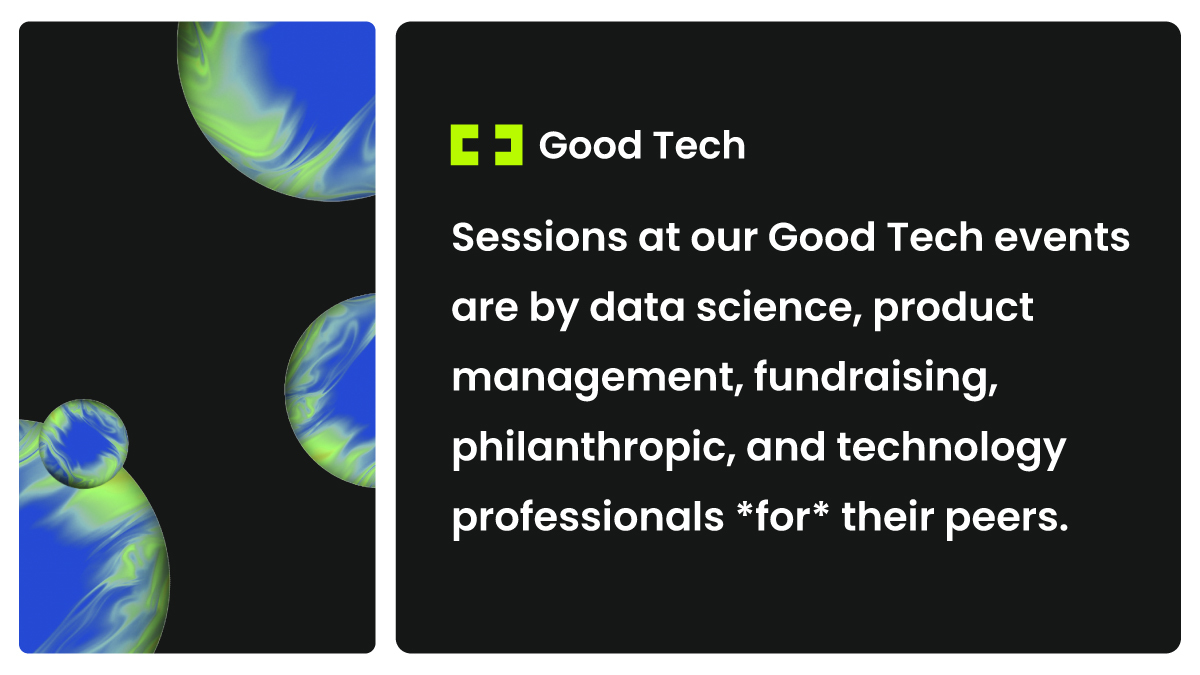4 Takeaways from Good Tech Fest
Understanding 2023 barriers and opportunities to building a diverse, purpose-minded company culture.
Introduction
Setting blue-sky goals for your organization’s social impact is one thing. Empowering an engaged community of people to make it happen is another.
Stav Kashi, VP of Product at Deed, and Kathryn Pisco, Head of Sales at Deed, recently hosted “2023 barriers and opportunities to building a diverse, purpose-minded company culture,” a lively virtual panel discussion at this year’s Good Tech Fest.
This discussion explored concrete strategies for democratizing and scaling social impact through employee resource groups (ERGs) and other community-building principles. Our team discussed why ERGs must evolve to be more inclusive and accessible. With a demo of Deed's new community-building features, our team showed how creating a dedicated space for people to do good deeds together, recognize each other's passions, and join together in common cause can help any organization's social impact to flourish.
ICYMI, here's a quick glimpse of the conversation:
So how can complex global organizations go beyond strong written DEIB policies and create a more inclusive and inspiring workplace culture? Here are some proven tactics.
4 Takeaways from Good Tech Fest
1. The most successful engagement strategies combine social impact + DEIB efforts
Social impact includes everything from employee giving and volunteerism to corporate grantmaking. While most often nested under the umbrella of environmental, social, and governance (ESG) efforts, it’s important to also think about the ways that strong diversity, equity, inclusion, and belonging (DEIB) efforts can contribute to a meaningful social impact.
For example, giving employees a platform to have open discussions about the issues most important to them will cause engagement and enthusiasm to skyrocket.
In fact, most companies are actually increasing their investment in DEIB right now, and many who do it alongside DEIB efforts are seeing “overall performance benefits.”
The message is clear: inclusive social impact programs that offer opportunities to engage with causes employees care about are proven to strengthen social and environmental impact.
2. Employee engagement in DEIB is essential
Research shows that employee engagement is an essential component of any effective DEIB policy, but only if the perspectives of employees across the spectrum of seniority are included.
In Getting to Diversity, Frank Dobbin and Alexandra Kalev study decades of United States government employment data to trace our collective progress toward a truly equal playing field. The sociologists show that women, people of color, and LGBTQIA+ employees reach management positions less easily and with less regularity than their peers. Their startling conclusion is that if diverse employees aren’t reaching management positions, that means they are not directly involved in the making of DEIB policies, therefore it will be less likely that their needs get met.
There are many ways to involve employees in the process of making your workplace more inclusive.
3. ERGs are more likely to be effective in community-building than any other dimension
While employee resource groups (ERGs) have been around for decades—with a presence now at over 90 percent of the Fortune 500—many companies are still figuring out how to give these communities the tools they need to not only improve inclusion but make a broader social impact.
By connecting their members to colleagues and parts of the business looking to embed diversity in operations and core strategy, ERGs drive social impact. We’ve seen that employees who rate their ERGs as “effective” or “very effective” are typically more likely to say they feel included.
However, it’s important to ensure clear communication about each ERG’s purpose and goals. The ERG’s activities should align with the corporate DEIB strategy; in turn, ERG leaders deserve sufficient resources and support to run their programs to the best of their ability.
4. Provide options, communicate, and be a DEIB catalyst
Employees need organizational support to make DEIB principles a part of their everyday lives, especially through community efforts, charitable giving, and volunteerism. To be an effective DEIB leader it’s important to give your people the tools they need to set the parameters of success themselves.
While steadily pushing your fundraisers and volunteer events forward, you should also take care to communicate in concrete terms and with sufficient detail such that your employees can always see what options they have available to them. Make it clear that it’s up to them to incorporate DEIB principles into their daily lives, and that the organization will support them every step of the way.
To that end, visible, tangible organizational support is crucial. You might offer a social impact tech platform that surfaces volunteering and donation opportunities that help employees take a hands-on approach to DEIB. You might also offer unique donation matching (1:1, 2:1, or even 3:1) for gifts to nonprofits that promote inclusivity.
In this way you might think of yourself as the in-house catalyst for creating an evermore diverse, equitable, inclusive, and welcoming workplace.
Final thoughts
Good Tech Fest is a series of global virtual and in-person events that bring “data nerds, technologists, product leaders, philanthropists and more to learn from one another, build our capacities for using technology for impact, and wrestling with the challenges and limitations of technology in the social sector.”
The Deed team is always grateful for the chance to connect with that community and talk about how to use social impact tech to make every workplace more inclusive. At a time when employee engagement and corporate social responsibility frequently go hand in hand, we're thrilled to see some of the largest organizations in the world become leaders in good tech.
To hear more about how our user-friendly social impact platform is helping industry leaders from Airbnb to lululemon raise the bar for DEIB, see a demo now.


